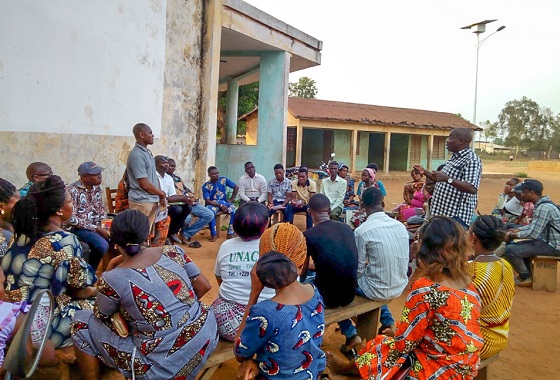August 18, 2022
DeWorm3 generates evidence about the cost, acceptability, and optimal delivery of community-wide mass drug administration

A community sensitization meeting in Benin. Photo courtesy of DeWorm3.
The DeWorm3 Study is an ongoing series of community cluster randomized controlled trials that use a community-wide drug administration (cMDA) approach to determine whether deworming both children and adults can disrupt the transmission of soil-transmitted helminth (STH), or parasitic intestinal worms, across multiple geographies including India, Malawi, and Benin. Achieving high coverage in DeWorm3 is therefore essential to improve the impact of cMDA and limit transmission of STH infections that can result in disabling chronic conditions, delayed growth and cognitive development, severe social stigma, and lost economic productivity.
The DeWorm3 research team recently published three new publications in BMJ Open and BMC Health Services regarding cMDA implementation with findings on the optimal implementation packages for delivering high coverage cMDA for STH, the costs of cMDA vs school-based deworming (SBD), and the implementation climate for cMDA for STH.
In summary, researchers found that in these heterogenous settings certain factors influence high cMDA coverage including acceptability and community sensitization, existing widespread and reliable drug distribution platforms, and robust training of implementors. DeWorm3’s bi-annual cMDA was generally acceptable within the study sites (Benin, India and Malawi) where cMDA was integrated into existing community health programs with established, trained staff and proven/trusted drug distribution networks. Tailoring programs to local context was paramount for success of cMDA. In addition, efficient duration of cMDA delivery is crucial to achieve high coverage, especially when combined with a conducive implementation framework, early arrival of anti-helminths drugs before cMDA, and flexible community sensitization. CDMA, as an alternative to school-based deworming programs, is generally acceptable across three different and varied geographical locations.
The studies also show that cMDA unit cost were more expensive than school-based deworming (SBD) especially in India and Malawi. However, the unit cost in Benin for cMDA and SBD were comparable. Despite this, cMDA had wider coverage since it targeted more people in the community. Through these publications, the DeWorm3 study contributes to the growing pool of knowledge on cMDA implementation to support evidence-based decision-making for policy makers particularly in low- and middle-income countries. The findings reflect the dedication and massive efforts of the entire team to collect data, with special acknowledgement to the implementation science teams across all sites to promote the evidence into practice.